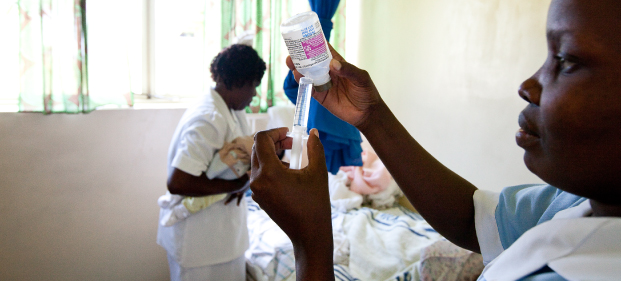Where We Work
See our interactive map


When health workers are comfortable and well-managed, everyone is safer—including the patients.
Little things can do wonders to get you through a tough day at work. Maybe it’s a few minutes of peace during a bathroom break. Or the pride that comes with knowing how to carry out a tricky task. Or maybe it’s the knowledge that at the end of the week, you’re going to get paid—enough and on time.
But a smooth-running workplace where all these things can happen is impossible without good management. When everyday operational tasks fall by the wayside, employees are miserable (and sometimes resentful). Pandemonium ensues. The workplace can even become unsafe.
According to surveys conducted by Kenya’s ministries of health, more and more of the country’s clinicians are being promoted into management positions before they’ve had any managerial training. Many have no experience or instruction in how to keep their staffs motivated, how to deal with the bureaucracy of training or disciplining workers, or even how to maintain adequate toilet facilities for their employees.
That’s why IntraHealth’s Capacity Kenya project is now working with the Kenyan ministries of health to offer a computer-based training program designed specifically for health facility and hospital managers.
The new eLearning course covers everything from making sure employees have the physical tools they need (think functioning lamps and blood pressure cuffs) to recognizing performance problems in employees and how to deal with them. It also gives guidance on how to create a good work environment, how to retain staff, how to be a supportive supervisor, and how to be sensitive to gender in the workplace.
When employees have a good environment and the equipment and training they need, it’s easier for them to do their jobs. When they feel valued by their managers, they’re more likely to work hard and take pride in what they do. Employees become happier, absenteeism drops, and patients get better care.
Kenya has a huge shortage of health workers—only one doctor and 12 nurses and midwives for every 10,000 people, according to the World Health Organization. So it’s crucial that the existing workforce be managed effectively and that more health workers are motivated to show up for their shifts.
Take the bathroom issue, for example. In some Kenyan health facilities, workers get frustrated when they see that patient toilets are more comfortable and functional than staff toilets. In other facilities, staff toilets are shared by both men and women. This can lead to uncomfortable circumstances—or even dangerous ones, especially for women.
Over time, situations like these wear employees down and leave them feeling demoralized. In mild cases, workers may sometimes stay home to avoid the inconveniences or indignities they face at work. In more extreme cases, they take out their frustrations on their patients. There have been instances of violence against patients, and of staff members extorting money from them. (This tends to happen when a worker feels underpaid—or hasn’t been paid because of payroll disarray.)
IntraHealth’s Human Resource Management Professional Development Course will help create a pool of workers for Kenya who have the health workforce management skills to make tough personnel decisions and run complex facilities.
The course is still in its beginning stages, but so far, managers love it. Every participant in the field testing group absorbed the information quickly and came away with a high score on the final quiz. The Capacity Kenya team will use the results of their preliminary field tests to improve the course’s content and expand it.
When the training modules are fully developed and released, they will be available to health workers throughout the country through CD-ROM and the Internet. Managers can take the course whenever is most convenient for them, without even leaving work. Its computer-based structure will ensure that managers across Kenya all learn the same material and that it can be easily updated (for example, when a health policy changes).
Better management will help more of Kenya’s health workers get through tough days at work, and to do work they’re proud of.
More information:



